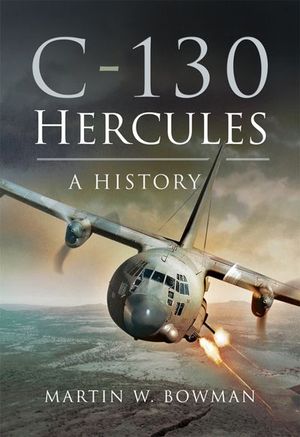C-130 Hercules
“An engaging retrospective on the long-lived and ubiquitous C-130 Hercules tactical airlifter . . . Sweeping in its scope . . . an invaluable reference.” —Aviation History
Designed in response to a 1951 requirement, the C-130 Hercules is the most successful military airlifter ever built. Since it first flew in prototype form on August 23, 1954, more than 2,100 have been produced in over eighty different versions. Across its variants, the Hercules serves more than sixty air forces, as well as many civilian cargo operators, in a multiplicity of roles, including air-to-air refueller, gunship, airborne command post, flying hospital, and firefighter.
This rugged and easily maintained aircraft entered service in 1956 with the USAF Tactical Air Command. Ten years later, the “Charlie 130” was providing essential logistical support in Vietnam. This period in Southeast Asia was the Hercules’ finest hour. Paradrops, airlift, and evacuation operations were completed around the clock, often at low level, usually under fire and nearly always in bad weather.
A generation later, this “Mr. Dependable” was serving with equal distinction in the Gulf War in the role of airlifter, radio-countermeasures, and “psy-ops” platform, gunship and, once again, “block-buster bomber.” The “Herky Bird” or “Fat Albert,” as the C-130 is fondly known, has proved a key component in humanitarian relief operations, as well, in all parts of the world.
“Martin’s technical and informative look at their creation and use is absolutely fascinating. An iconic aircraft gets Martin’s VIP treatment in this wonderful book.” —Books Monthly
“A history of an aviation great, from the pen of a popular and well-established author of aviation history.” —Firetrench
Designed in response to a 1951 requirement, the C-130 Hercules is the most successful military airlifter ever built. Since it first flew in prototype form on August 23, 1954, more than 2,100 have been produced in over eighty different versions. Across its variants, the Hercules serves more than sixty air forces, as well as many civilian cargo operators, in a multiplicity of roles, including air-to-air refueller, gunship, airborne command post, flying hospital, and firefighter.
This rugged and easily maintained aircraft entered service in 1956 with the USAF Tactical Air Command. Ten years later, the “Charlie 130” was providing essential logistical support in Vietnam. This period in Southeast Asia was the Hercules’ finest hour. Paradrops, airlift, and evacuation operations were completed around the clock, often at low level, usually under fire and nearly always in bad weather.
A generation later, this “Mr. Dependable” was serving with equal distinction in the Gulf War in the role of airlifter, radio-countermeasures, and “psy-ops” platform, gunship and, once again, “block-buster bomber.” The “Herky Bird” or “Fat Albert,” as the C-130 is fondly known, has proved a key component in humanitarian relief operations, as well, in all parts of the world.
“Martin’s technical and informative look at their creation and use is absolutely fascinating. An iconic aircraft gets Martin’s VIP treatment in this wonderful book.” —Books Monthly
“A history of an aviation great, from the pen of a popular and well-established author of aviation history.” —Firetrench
BUY NOW FROM
COMMUNITY REVIEWS

